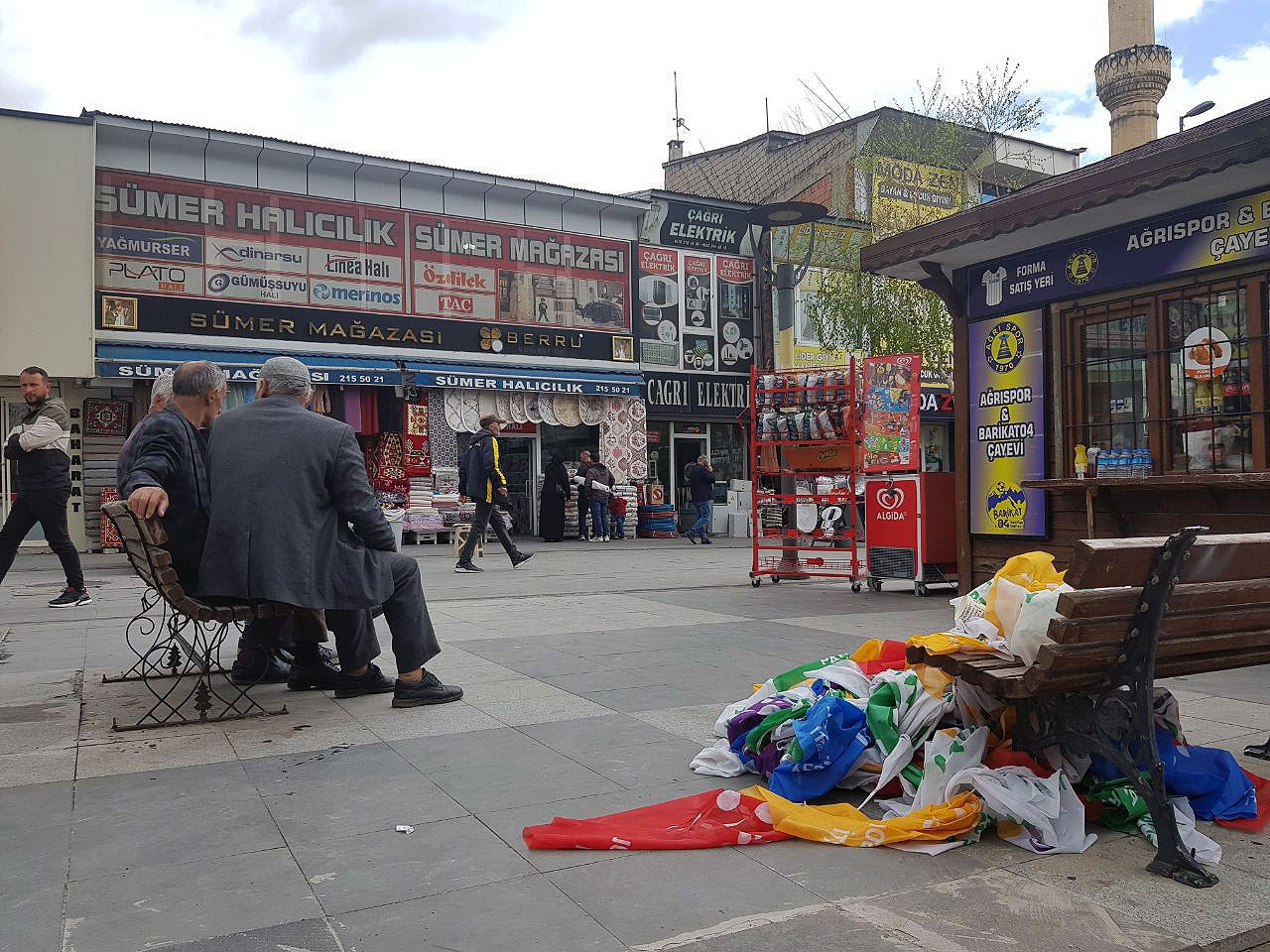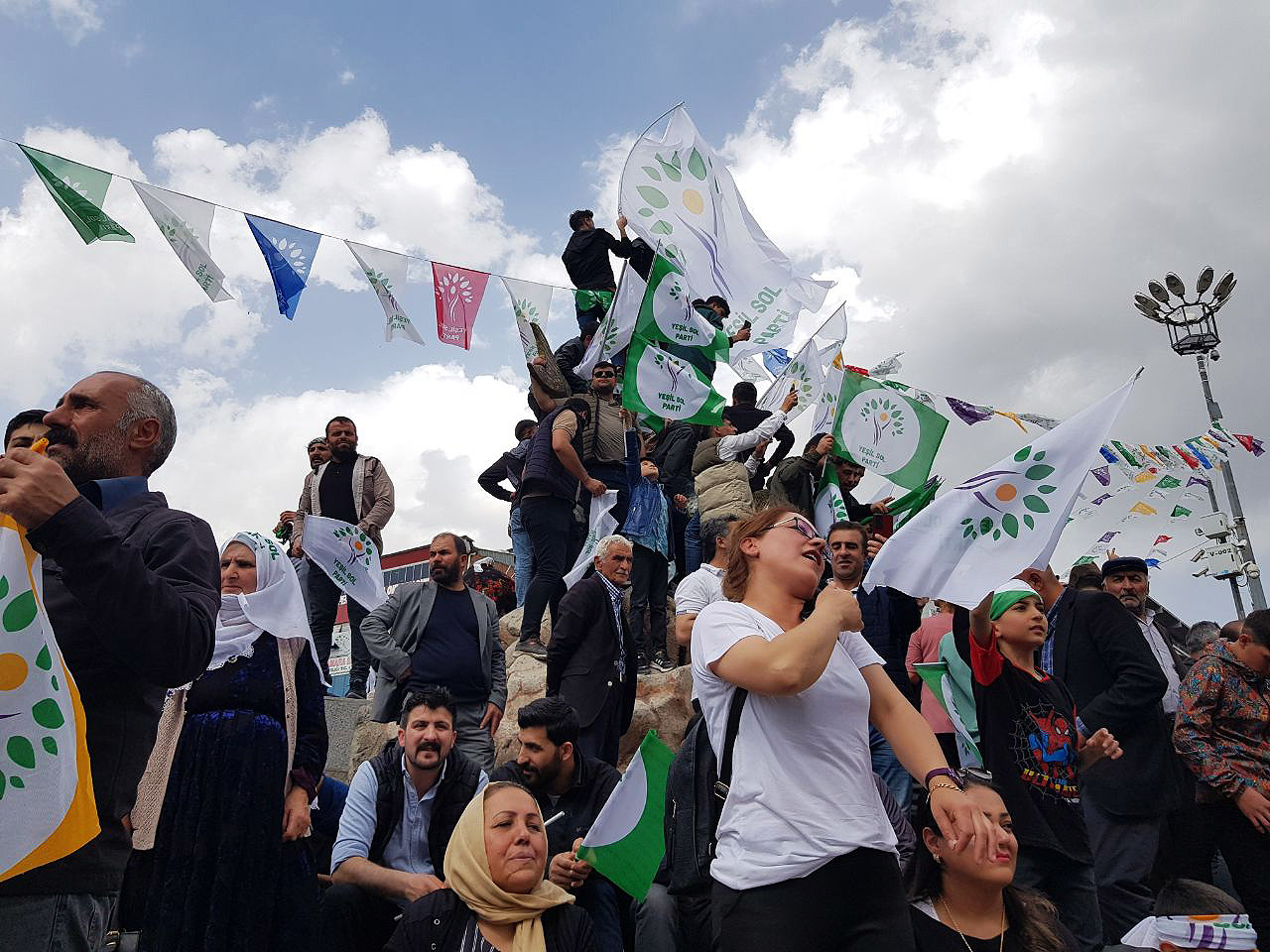
Post-election atmosphere in Ağrı (Photo F. Brusa)
After last Sunday's vote, in southeastern Turkey between Van and Ağrı, the prevailing sentiment is that of resignation, if not bitter pessimism. The pre-election euphoria has given way to profound uncertainty
The results are still pending, but the disappointment has already arrived. In the extreme south-east of Turkey, between Van and Ağrı, for many people the news of the runoff sounded like a defeat: in the offices of Yeşil Sol Parti, a party joined for these elections by the pro-Kurdish forces of the HDP, the prevailing sentiment is that of resignation, if not bitter pessimism.
"Basically, we are already counting who will go to jail in the coming months", some murmur, fearing Erdoğan's further squeeze on the political movement (HDP co-founder Selahattin Demirtaş has been in prison for the past five years, and was not allowed to run as a candidate). "I have no idea what to do, I'll probably try to get out of Turkey", speculate others hotly, while the hurt for the results is combined with the tiredness of a sleepless night counting ballots.
On the other hand, it is difficult for the opposition to be optimistic: with the votes of May 14, the incumbent president obtained 49% of the preferences, over 4 points ahead of challenger Kemal Kılıçdaroğlu of the republican-Kemalist CHP party (who ran with a coalition bringing together six different political organisations); not enough to win in the first round, but enough to make one believe that a victory in the runoff could almost be a formality: in fact, it is very probable that the votes of the third candidate Sinan Oğan (over 5%) will go to Erdoğan. Furthermore, in the national assembly, the AKP, the president's party, together with the nationalist allies of the MHP secured the majority with 322 seats out of 600.
Mobilisation and self-criticism
In Van, the atmosphere of collective mobilisation that reigned before the vote now seems to be back to a more private concern, a sense of personal uncertainty. Here, as in general in the cities of the west coast and in the southeast with a Kurdish majority, Kılıçdaroğlu had a clear advantage (62.2%) and on Saturday afternoon, with the end of the electoral campaign, tens of thousands of people had poured into the streets waving Yesil Sol Parti flags and waving a few smoke bombs. Perched on the monument located in the centre of the large roundabout at the crossroads between Cumhuriyet and Ferit Melen avenues, a monument dedicated to the typical fish of Lake Van which swims against the current during spawning, young and old alike hoped for a reversal of course which has not arrived.
"We probably need to improve our communication", say the leaders of the pro-Kurdish forces in an attempt at self-criticism. "We are convinced that many people, especially in rural areas, have not fully understood the fact that we supported the CHP candidate for the presidential elections and the absence of the abbreviation HDP on the lists disoriented many". It is difficult to understand, however, if these issues have significantly affected the final result.
What is certain is that, between Van and Ağrı, political activity must take into account different dynamics from other areas of the country, especially the large western centres. It should not be forgotten that, following the 2019 municipal elections, many duly elected HDP mayors were removed with a coup de main by the government which replaced them with "special commissioners" (kayyum). This has certainly generated greater discontent but, it is legitimate to suppose, also further distrust in democratic mechanisms. Furthermore, Van and Ağrı are among the poorest and least developed provinces of Turkey (respectively in third from last and last place for GDP per capita), with a large portion of the population employed in the agricultural sector: factors which, as happens for the "deep Anatolia" of the central areas, tend to favor the authoritarian, "pro-Islamic" rhetoric of the governing party (the mayor of Ağrı, for example, was elected with the Akp).
"We won but in the end Erdoğan will win", says the president of the local CHP section of Ağrı Nihat Aslan, commenting on the news of the runoff with a paradoxical formula. According to him, the majority of the country strongly supports Kılıçdaroğlu but the AKP (a party which Aslan left due to "too much corruption") controls the media and part of the institutions, so a few moves are enough to tilt the results in its favour.
“Here in the provinces, the Republican party had little presence until a couple of years ago. Only now have we managed to be more active in the area and we are gathering interest above all from young people, who want change”, continues Aslan.
Indeed, even in Ağrı, despite the dynamics marked by poverty and scarce urbanisation, in this round the opposition to Erdoğan triumphed: Kılıçdaroğlu won 65.8% of votes, an even higher percentage than in Van.
Silent majority?
Although the CHP appealed to the Supreme Electoral Council for a recount of the vote across the country, elections in the region still appear to have taken place in a generally fair manner. On Sunday the city of Van was massively garrisoned by military forces who were present in the streets also with anti-riot means, which was repeatedly criticised by pro-Kurdish parties because it is a situation that can easily be perceived as "intimidating" by their supporters. However, no incidents were recorded and during the night the security officers cleared the streets and squares as they had occupied them during the day. In Ağrı, on the other hand, there was an almost exclusive police presence, limited to polling stations.
Paradoxically, on the other hand, the winner party is not out in celebration: at the local AKP office there is little willingness to discuss or comment on the elections, at least with "outsiders". The (unelected) candidate Mehmet Ali̇ Bi̇lgi̇li̇, surrounded by some rather young people who at times look amused, claims that our questions about what policies the AKP will implement in the future and about the trend of the vote in the areas hit by the earthquake are "provocations” which he does not intend to answer. "Don't trust them, in my opinion they are spies", an official next to him openly suggests.
It is perhaps the portrait of a "majority" of society which in the Kurdish south-east is more silent than elsewhere but which, as demonstrated by the vote, remains firmly rooted in the territory and not at all willing to question its own power.








